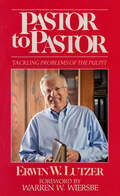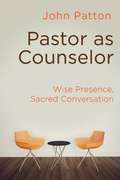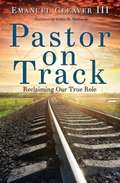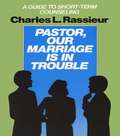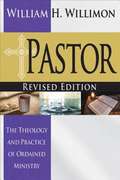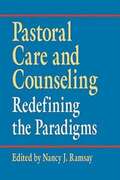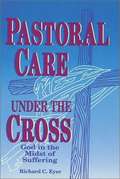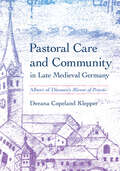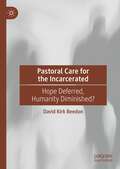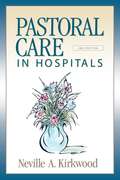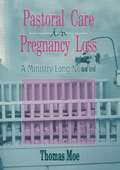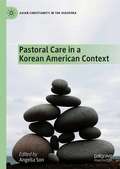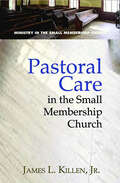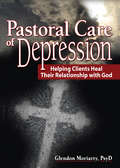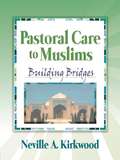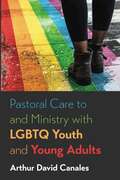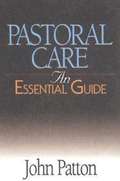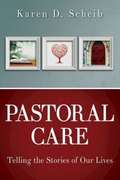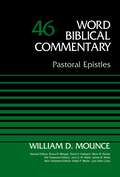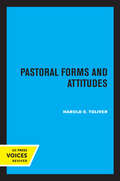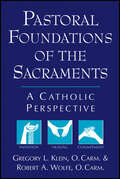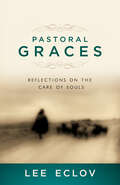- Table View
- List View
Pastor To Pastor: Tackling Problems of the Pulpit
by Erwin W. LutzerAlong with the special role of pastor come special problems and tough issues that must be handled gracefully, effectively, and sometimes publicly.Pastor to Pastor is an inspiring collection of twenty articles written by Erwin Lutzer, senior pastor of The Moody Church in Chicago. Dr. Lutzer offers practical advice on how to handle difficult situations involving:unrealistic expectations from the congregationlazy Christiansnegative and critical church membersburnout politicschurch splitscounselingpublic invitationsconflicts with the church board... and moreDr. Lutzer gives pastors encouragement and solutions that will help them better serve God and their churches.
Pastor To Pastor: Tackling Problems of the Pulpit
by Erwin W. LutzerAlong with the special role of pastor come special problems and tough issues that must be handled gracefully, effectively, and sometimes publicly.Pastor to Pastor is an inspiring collection of twenty articles written by Erwin Lutzer, senior pastor of The Moody Church in Chicago. Dr. Lutzer offers practical advice on how to handle difficult situations involving:unrealistic expectations from the congregationlazy Christiansnegative and critical church membersburnout politicschurch splitscounselingpublic invitationsconflicts with the church board... and moreDr. Lutzer gives pastors encouragement and solutions that will help them better serve God and their churches.
Pastor as Counselor: Wise Presence, Sacred Conversation
by John PattonThis very practical book offers no-nonsense instructions for pastors,chaplains, and ministers whose real specialty is the practice ofrelational wisdom. Patton provides a helpful, step-by-step template forpastoral counseling sessions and clear guidelines for understanding whento defer and how to refer—all while remaining faithful to the basicpastoral calling to connect persons seeking help with the relationshipsand resources they need to deal with their lives. "In a societyof specialists, John Patton’s Pastor as Counselor is a bold reminder ofthe healing potential of 'care-full' attending to lost and separatedpersons through the unique relational wisdom of the generalist pastor.This is vintage Patton, written with gentle wisdom and generous counselsummarizing decades of practicing and teaching pastoralcounseling."—Herbert Anderson, Emeritus Professor of Pastoral Theology,Catholic Theological Union, Chicago, IL, and Faculty in PracticalTheology, Graduate Theological Union, Berkeley, CA "John Pattonwrote this 'how-to' book for ministers without specialized training inmental health issues. Ministers are good at developing and deepeninghuman relationships, and that is exactly what they need in order tobecome skilled short-term pastoral counselors. Concrete, down-to-earth,and quintessentially practical, this is a book that should be on thesyllabus of every seminary’s introduction to pastoral care andcounseling. It is the fruit of a lifetime of reflection and embodiedrelational wisdom at its best." —Deborah van Deusen Hunsinger, CharlotteW. Newcombe Professor of Pastoral Theology, Princeton TheologicalSeminary, Princeton, NJ "When it comes to counseling, our firstport of call is often the mental health professions. In this book JohnPatton carefully draws out what is special about pastoral counseling.With theological depth and wise practical utility, he offers a clearguide for pastoral counselors as to what it is that gives them theiridentity and what that looks like in practice. This is a wise and deeplypractical book that will inevitably be transformative." —John Swinton,Chair in Divinity and Religious Studies; School of Divinity, History andPhilosophy; University of Aberdeen; Aberdeen, UK "John Pattonhas acquired unparalleled wisdom over decades of providing, supervising,teaching, and writing about pastoral care. This most gifted and deeplyreflective thinker has crafted a primer that will become a classic,spelling out what’s central for those new to the vocation, reminding themore seasoned of what really matters."—Chris R. Schlauch, AssociateProfessor of Pastoral Psychology and Psychology of Religion, BostonUniversity School of Theology, Boston, MA"Patton's book nicely parallels what he asks pastors to do in counseling others. Through a well-developed structure, he offers wise presence, spiritual conversation, and relational wisdom. His book would be a valuable resource in an advanced pastoral care course in a theological school. Similarly, a peer group of pastors would benefit from collective engagement with insights it provides as they assess their pastoral counseling relationships." Kenneth J. McFayden, Union Presbyterian Seminary, Richmond, Va. (Interpretation: A Journal of Bible and Theology 71(4)
Pastor on Track: Reclaiming Our True Role
by Emanuel Cleaver IIISo often, pastors are defined by external forces, rather than by the essential nature of the pastoral leader as modeled in scripture.Taking positive steps to put "pastors on track," author Emmanuel Cleaver III draws on his own experiences, and from dynamic and effective pastors and churches across the country. He presents biblical models to distill his message and to recalibrate the definition of what makes the best church leaders.Pastor on Track helps clergy re-frame their congregation's expectations and to empower them to do the work of the people, so the pastor can do the work of the pastor.
Pastor, Our Marriage Is in Trouble: A Guide to Short-Term Counseling
by CharlesL. RassieurActing with genuine care and concern, pastors can be effective in helping married couples resolve difficulties and discover reconciliation, joy, and love. The question often is, “How do I do it?” In Pastor, Our Marriage Is in Trouble, Charles L. Rassieur, an experienced counselor, outlines a step-by-step approach that takes the pastor from beginning to end in a process of short-term intervention and counseling. A helpful tool in the process is the Pastoral Marriage Counseling Questionnaire, which can be used in gathering essential information about both spouses and their relationships. In addition, you’ll find important information about: a rationale for the need and opportunity for pastoral intervention in troubled marriages how the marriage counseling process begins with the initial pastoral contact with one or both spouses help for the pastor in preparing for individual counseling sessions with each spouse important topics for marriage counseling regardless of which approach or model is used the last two sessions of counseling: deciding whether to end counseling, to refer the couple to other professional resources, or to contract with the couple for further counseling sessions
Pastor: The Theology and Practice of Ordained Ministry
by William H. WillimonOrdained ministry, says Will Willimon, is a gift of God to the church—but that doesn't mean that it is easy. Always a difficult vocation, changes in society and the church in recent years have made the ordained life all the more complex and challenging. Is the pastor primarily a preacher, a professional caregiver, an administrator? Given the call of all Christians to be ministers to the world, what is the distinctive ministry of the ordained? When does one's ministry take on the character of prophet, and when does it become that of priest? What are the special ethical obligations and disciplines of the ordained?Pastor: Revised Edition explores these and other central questions about the vocation of ordained ministry. It begins with a discussion of who pastors are, asking about the theological underpinnings of ordained ministry, and then moves on to what pastors do, looking at the distinctive roles the pastor must fulfill. The book also draws on great teachers of the Christian tradition to demonstrate that, while much about Christian ministry has changed, its core concerns—preaching the word, the care of souls, the sacramental life of congregations—remains the same.Ordained ministry is a vocation to which we are called, not a profession that we choose. To answer that call is to open oneself to heartache and sometimes hardship; yet, given the one who calls, it is to make oneself available to deep and profound joy as well.
Pastoral Care And Counseling: Redefining The Paradigms
by Christie Cozad Neuger Bonnie J. Miller-McLemore Joretta L. Marshall Emmanuel Y. LarteyPastoral Care and Counseling has changed radically since the publication of the Dictionary of Pastoral Care and Counseling. Rapid changes have occurred in theological, social, and medical contexts broadening the understanding of care. The shift from the "living human document" to the "living human web" both enriches and challenges the study and practice of pastoral theology. Just as the Dictionary of Pastoral Care and Counseling defined the field of Pastoral Care, this volume brings the field current. Edited by Nancy J. Ramsay. Contributors for the essays include Nancy J. Ramsay, Joretta L. Marshall, Emmanuel Y. Lartey, Christie Cozad Neuger, Bonnie J. Miller-McLemore, and Loren L. Townsend. Topics include: Pastoral Theology; Public Theology; Power and Difference; Globalization, Internationalization, and Indigenization; Training in Clinical Ministry; Methodology.
Pastoral Care Under the Cross: God in the Midst of Suffering
by Richard C. EyerThis book brings the theology of the cross into practice as a source of comfort for the sick and dying, the elderly, the depressed and mentally ill, persons with AIDS as well as the families of those afflicted. It takes a Gospel-centered approach to counseling and addresses the ethical and moral dilemmas which physicians, patients and families must face.
Pastoral Care and Community in Late Medieval Germany: Albert of Diessen's "Mirror of Priests" (Medieval Societies, Religions, and Cultures)
by Deeana Copeland KlepperPastoral Care and Community in Late Medieval Germany explores how local religious culture was constructed in medieval European Christian society through close study of a set of neglected, late fourteenth-century manuscripts. The Mirror of Priests is a pastoral work written by Albert, an Augustinian canon from the Bavarian market town of Diessen, to guide local priests in their work with parishioners. Multiple versions of the text in Albert's own hand survive and, by comparing them, Deeana Copeland Klepper shows how ostensibly universal religious ideals and laws were adapted, interpreted, and repurposed by those given responsibility to implement them, thereby crafting distinctive, local expressions of Christianity.The vision of Christian community that emerges from Albert's pastoral guide is one in which the messiness of ordinary life is evident. Albert's imagined parish was marked out by geographic and legal boundaries—property and jurisdictional rights, tithes, and sacramental responsibility—as well as symbolic realities. By situating the Mirror of Priests within Albert's physical and conceptual spaces, Klepper affirms the centrality of the parish and its community for those living under the rubric of Christianity, especially outside of large cities. Pivoting between the materiality of texts and the sociocultural contexts of an overlooked manuscript tradition, Pastoral Care and Community in Late Medieval Germany offers fresh insights into the role of parish priests, the pastoral manual genre, and late medieval religious life.
Pastoral Care for the Incarcerated: Hope Deferred, Humanity Diminished?
by David Kirk BeedonThis book explores and formulates a response to the question: How best can those held in modern systems of mass incarceration be cared for pastorally when many prisons diminish both hope and humanity? Employing the multi-disciplinary approach of practical theology, this ethnographic enquiry will be a guide for chaplains and all who strive to embody compassion wherever human flourishing is undermined. The book’s structure follows the pastoral cycle method from practical theology, remaining context-based and practice-focused throughout. Pastoral insights are illustrated with personal, poetic and movingly reflective material drawn from the lived experience of indeterminately sentenced men who did not know if or when they would be ever released. The author, a former prison chaplain, remains reflexively and humanely present in the text, modelling the profound humane regard and pastoral presence that is central to this work. This book will take the reader deeply into penal spaces on a journey of both compassion and hope.
Pastoral Care in Hospitals
by Neville A KirkwoodAn essential handbook for bedside ministry, and for providing meaningful and enriching comfort to the sick and dying. Bringing comfort and concern to the seriously ill or injured is a challenge for lay people and clergy alike. In this practical guide, Neville Kirkwood shares wisdom gained from years of experience as a hospital chaplain–on the art of hospital visitation. This classic handbook, now updated, contains all the tools needed to address a variety of concerns: * Considering the privacy of the patient, and of friends and relatives * Realizing the time and place for prayer * Avoiding the pitfalls of bedside ministry * Imparting feelings of empathy and awareness * Handling depression, suffering, and despair * Understanding the non-verbal communications of the patient * Accepting when your services are not welcome * Acknowledging your own motivations Featuring additional sections addressed to clergy and trained lay pastoral workers, as well as those designed for lay volunteers, as well as a variety of exercises and prayers for specific circumstances, this is a “must-have resource for all who work with the sick and dying” (South Dakota Church News).
Pastoral Care in Pregnancy Loss: A Ministry Long Needed
by Thomas MoeUntil now, the church has been unaware of the need for ministry to those suffering from pregnancy loss. At a time when approximately one in four pregnancies ends in loss, the need to understand and provide caring ministry is painfully obvious. Pastoral Care in Pregnancy Loss introduces the religious community to the issue of pregnancy loss and describes the ministries that can be helpful to those who experience these tragedies. Effective ministry in pregnancy loss requires that one develop basic life theories in order to prepare for such in-depth care. Thus, the book is more than a “how to” as it explores why there is suffering and why some suffer more than others, how to find grace when God seems far away, how to minister when we don’t have answers, and how religious ministry can consistently work with other helping professionals in support of the individual. With the foundation of ministry theory provided by Pastoral Care in Pregnancy Loss, you can help your faith community develop strategies for ministry to those suffering from pregnancy loss. Numerous case studies illustrate what is usually done wrong in providing pastoral care in these difficult and delicate situations and explain why those who experience loss may blame themselves, why they may blame God, and why they may not feel able to return to church. Providing helpful insight to hospital pastoral care departments, church libraries, funeral directors, counselors and psychologists, nursing and obstetrics professionals, and seminaries with a marriage and family ministry specialty, this book provides readers with information about: three types of pregnancy loss--miscarriage, still birth, and neonatal loss church outreach the grieving process victims as “consenters” or “experiencers” the spiritual needs of those suffering loss practical ministries crisis support and long-term support.Pastoral Care in Pregnancy Loss furthers your understanding of pregnancy loss by enumerating theories on how suffering and loss are viewed by those suffering--either as a time of testing, a time of training, a mystery of God, a sign of punishment and warning, or as having no meaning. The book also shows how pregnancy loss affects five different types of personal relationships and discusses both immediate and long-term concerns of providing pastoral care. From helping the victim find meaning or reason for the loss to providing support in preparing for future pregnancies, this book provides much-needed guidance to an often-neglected ministry.
Pastoral Care in a Korean American Context (Asian Christianity in the Diaspora)
by Angella SonThis book provides theoretical background and pastoral strategies for pastors, lay leaders, and congregation members to foster a restoration of the human dignity imputed by God and the good community God desires. It addresses issues in pastoral care and pays particular attention to Korean and Korean American contexts. Some of the specific issues addressed include wisdom for common life (Chung Yong) as a theological and pastoral task, tension between Confucianism and feminism, care of the abused and abusers in intimate violence, ageism and elderly care, racism and cultural identity of Korean youth, sexual ethics among Korean young adults, and depression and addiction among Korean American youth and young adults. All of the contributors have a strong background in clinical and/or pastoral practices in addition to theoretical expertise.
Pastoral Care in the Small Membership Church
by James L. Killen JR.An introduction to pastoral care for pastors of small membership churches.“If you spend your whole life serving small membership churches and doing it well, yours will have been a life well spent.” Small membership churches have a real advantage when it comes to incorporating people into a fellowship where they are known and where their needs are met. These churches and their pastors have an opportunity for excellence in this area, and should make the most of it. Good pastoral care can be the key to effectiveness in all of the other ministries of the church.From getting acquainted with your congregation, weddings and funerals, picking up on subtle cues in a conversation to not-so-subtle conflicts, Killen shares insights from years of ministry in a small membership church setting.James L. Killen, Jr. is a retired elder of the Texas Conference, contributor to Circuit Rider, and author of Who Do You Say That I Am? A Personal Reader.
Pastoral Care of Depression: Helping Clients Heal Their Relationship with God
by Glendon MoriartyThis book provides the essential tools needed to transform negative God images in depressed clients! Pastoral Care of Depression: Helping Clients Heal Their Relationship with God is designed to help clergy and mental health professionals understand how depression negatively affects the way people emotionally experience God and how, through therapy, this hurtful God image can be changed into a much more positive one focused on healing.In the past, the God image (as well as the essential differentiation between God image and God concept) has been explained in dull, analytic terms that are difficult to understand. This book&’s jargon-free language and engaging presentation make it an effective learning tool for students and professionals alike. Inside, you&’ll find numerous psychological tests, complete with sample test forms, that identify the God image. These are clearly explained and include all the information needed to take, administer, and interpret them. Pastoral Care of Depression teaches you to use psychodynamic and cognitive interventions to change a client&’s God image, including foundational knowledge and clearly presented techniques to implement in the therapeutic relationship. This comprehensive treatment manual arms you with the most comprehensive array of cognitive interventions published to date, with tens of easy-to-follow techniques designed to tap directly into an individual&’s subjective experience of God. Two appendixes give you a sample God Image Automatic Thought Record and Treatment Plan form.Part I: Depression and the God Image examines: the nature and development of depression symptoms of depression specific to religious people defining a client&’s image of God, how it developed, and what it reveals the relationship between self, depression, and God image, and how God images relate to Christian thoughtPart II: Changing the God Image addresses: the importance of self-evaluation for therapists and counselors-and how to do it the nature of the therapeutic relationship counseling skills that strengthen the therapeutic relationship how to conduct an God Image Assessment Interview and how to work with what that interview reveals transference, countertransference, cyclical maladaptive patterns, and internalization in psychodynamic psychotherapy appropriate, effective psychodynamic interventions the essentials of cognitive therapy and how it can be utilized to positively affect the God image treatment planning and case conceptualization important ethical issues for considerationWith well-designed test and exercise forms and clear instructions on their use and interpretation, Pastoral Care of Depression provides the essential tools needed to work effectively with this important client group. Make it a part of your professional/teaching collection today!
Pastoral Care to Muslims: Building Bridges
by Neville A. KirkwoodFulfill Christ's injunction in Matthew 25!Pastoral Care to Muslims: Building Bridges recognizes that more and more often pastoral care workers are encountering Muslims in hospitals. This is the guidebook you need to provide the spiritual support these patients are able to accept--support that doesn't conflict with their religious affiliations.The first section of Pastoral Care to Muslims provides an outline of the major beliefs of Islam, chiefly those that relate to illness and dying. The Koran is freely quoted to support these beliefs and practices. The second section of the book delivers a set of guidelines for the practice of pastoral care to hospitalized Muslims. These guidelines have been field tested with positive results. The book's two appendixes supply you with samples of the kinds of prayers that are acceptable to Muslims. In this valuable book you'll find: background information about the Muslim faith quotations from the Koran that you can use in your practice what you need to understand about the Muslim view of sickness, death, and dying Plus explanations of terms and concepts found in Islam, including: the Islamic Creed Tawhid (the concept of the unity of God) Gehenna (Hell) the Five Pillars of IslamPastoral Care to Muslims: Building Bridges will help you do just that: build bridges between Christians and Muslims. It will supply you with material you can use to minister to Muslims without the fear of offending them and give you the confidence you need to deliver effective pastoral care to this growing segment of the population.
Pastoral Care to and Ministry With LGBTQ Youth and Young Adults
by Arthur David CanalesPastoral Care to and Ministry with LGBTQ Youth and Young Adults weaves sound theology and solid practice to offer insight and introspection about helping and ministering to some of our most vulnerable in our congregations and/or parishes—LGBTQ youth and young adults. Moreover, the book provides pragmatic pastoral strategies that can be successfully implemented into Christian youth ministries and young adult ministries. <p><p>The book examines traditional understandings of homosexuality and transgender in Scripture from a marginalized perspective. The book analyzes current theological and pastoral practice and “moves the needle” to offer new insights and fresh ideas regarding pastoral care to and ministry with LGBTQ young people. <p><p>This book is perfect for youth/young adult ministers, lay leaders, pastors, parents, and academics who are interested in LGBTQ issues, topics, and ministry. The book invites students, scholars, and practitioners to understand the subtleties and nuances of providing pastoral care and ministry to God’s queer young people. For anyone serious about LGBTQ young people, this book is a must!
Pastoral Care with handicapped Persons
by Lowell G. ColstonDescribes the role pastors play in the lives of people with disabilities.
Pastoral Care: An Essential Guide
by John PattonThe essentials of pastoral care involve the pastor's distinctive task of caring for those who are estranged--the lost sheep. Taken from the biblical image of the shepherd, the pastor by virtue of his or her professional calling cultivates wise judgment in order to hear the hurting and offer guidance, reconciliation, healing, sustaining presence, and empowerment to those in need. This book will outline the quintessential elements pastors need to wisely minister in today's context by discussing four major kinds of lostness: grief, illness, abuse, and family challenges. The purpose of the Abingdon Essential Guides is to fulfill the need for brief, substantive, yet highly accessible introductions to the core disciples in biblical, theological, and religious studies. Drawing on the best in current scholarship, written with the need of students foremost in mind, addressed to learners in a number of contexts, Essential Guides will be the first choice of those who wish to acquaint themselves or their students with the broad scope of issues, perspectives, and subject matters within biblical and religious studies.
Pastoral Care: Telling the Stories of Our Lives
by Karen D. ScheibChristian pastoral care is a narrative, ecclesial, theological practice (NET). As a narrative practice, pastoral care attends to the inseparable interconnection between our own lifestories, others’ stories, the larger cultural stories, and God’s story. As a ministry of the church, pastoral care is an ecclesial practice that derives its motivation, purpose, and identity from the larger mission of the church to bear witness to and embody God’s mission of love that extends beyond the church for the transformation of the world. As a theological practice, pastoral care is grounded in God’s love story. God’s profound love for humankind heals our brokenness when human love fails and invites us into an ongoing process of growth in love of God, self, and neighbor.Intended for those who provide care with and on behalf of religious communities, author Karen Scheib focuses on listening and "restorying" practices occurring in the context and setting of congregations. By coauthoring narratives that promote healing and growth in love, pastoral caregivers become cocreators and companions who help others revise and construct life-stories reshaped by the grace of God.What Karen Scheib has done in this book is to reposition pastoral care as a theological activity performed in the context of the church. She draws deeply upon her Wesleyan theological heritage, upon an understanding of life in its fullness as growth in love and grace, and upon a "communion ecclesiology" undergirded by a communal understanding of the Trinitarian life of God. Thus grounded, she envisions pastoral care first as a rhythm of the life of the whole church and secondarily as a work of trained pastors.In her vision, pastoral care is rescued from a narrow understanding of it as exceptional acts of intervention performed only in moments of dire crisis. Instead, it becomes a "daily practice of pastoral care," an attending, in love, to the stories of others and a "listening for ways God is already present in a life story." Solidly theological, grounded in the life of the church, and eminently teachable – Karen Scheib has given us a great gift in this book." from the Foreword -Thomas G. Long, Bandy Professor of Preaching, Emeritus, Candler School of Theology, Emory University, Atlanta, GA. "In a wonderfully engaging, reflective, and useful way, Karen Scheib captures something absolutely essential to pastoral care and yet often overlooked—the utter centrality of storytelling/listening, the power of stories to heal, and their vital connection to bigger stories told within religious communities. This book is a real milestone, reclaiming the importance of "narrative knowing" and grounding care not only in community but also within a comprehensive theological framework." --Bonnie J. Miller-McLemore, E. Rhodes and Leona B. Carpenter Professor of Religion, Psychology, and Culture, The Divinity School and Graduate Department of Religion, Vanderbilt University Divinity School, Nashville, TN"Implementing narrative personality and therapy theories and anchored in ecclesiology and Wesleyan theology (NET), Karen Scheib’s book advances a long awaited and holistic approach to pastoral care. Her NET approach presents the embodiment of pastoral care by emphasizing both narrative and paradigmatic knowing, proposes the subjectivity of our stories in pastoral care by pointing out the interchangeability between us and our stories as subject and object, and underscores the dynamic process of pastoral care through the interconnection of the storyteller, listener, and context. Scheib’s image of story companion contributes to the field as a new paradigm of pastoral care and promises to be a significant resource in generating hope and growth in love for both pastoral caregiver and receiver." —Angella Son, Associate Professor, Drew University, Madison, NJ"Pastoral theologian Scheib describes a narrative, ecclesial, and theological approach for listening to people’s life stories in such a way as to engender spiritual formation and gro
Pastoral Epistles, Volume 46 (Word Biblical Commentary)
by Bruce M. Metzger Ralph P. Martin Lynn Allan Losie David Allen Hubbard Glenn W. Barker John D. Watts James W. WattsThe Word Biblical Commentary delivers the best in biblical scholarship, from the leading scholars of our day who share a commitment to Scripture as divine revelation. This series emphasizes a thorough analysis of textual, linguistic, structural, and theological evidence. The result is judicious and balanced insight into the meanings of the text in the framework of biblical theology. These widely acclaimed commentaries serve as exceptional resources for the professional theologian and instructor, the seminary or university student, the working minister, and everyone concerned with building theological understanding from a solid base of biblical scholarship.Overview of Commentary OrganizationIntroduction—covers issues pertaining to the whole book, including context, date, authorship, composition, interpretive issues, purpose, and theology.Each section of the commentary includes:Pericope Bibliography—a helpful resource containing the most important works that pertain to each particular pericope.Translation—the author’s own translation of the biblical text, reflecting the end result of exegesis and attending to Hebrew and Greek idiomatic usage of words, phrases, and tenses, yet in reasonably good English.Notes—the author’s notes to the translation that address any textual variants, grammatical forms, syntactical constructions, basic meanings of words, and problems of translation.Form/Structure/Setting—a discussion of redaction, genre, sources, and tradition as they concern the origin of the pericope, its canonical form, and its relation to the biblical and extra-biblical contexts in order to illuminate the structure and character of the pericope. Rhetorical or compositional features important to understanding the passage are also introduced here.Comment—verse-by-verse interpretation of the text and dialogue with other interpreters, engaging with current opinion and scholarly research.Explanation—brings together all the results of the discussion in previous sections to expose the meaning and intention of the text at several levels: (1) within the context of the book itself; (2) its meaning in the OT or NT; (3) its place in the entire canon; (4) theological relevance to broader OT or NT issues.General Bibliography—occurring at the end of each volume, this extensive bibliographycontains all sources used anywhere in the commentary.
Pastoral Forms and Attitudes
by Harold E. ToliverThis title is part of UC Press's Voices Revived program, which commemorates University of California Press’s mission to seek out and cultivate the brightest minds and give them voice, reach, and impact. Drawing on a backlist dating to 1893, Voices Revived makes high-quality, peer-reviewed scholarship accessible once again using print-on-demand technology. This title was originally published in 1971.
Pastoral Foundations of the Sacraments: A Catholic Perspective
by Gregory L. Klein Robert A. WolfeA logical presentation of the sacraments as the principle acts of worship in the Catholic church. Synthesizes contemporary research on symbol, ritual, and sacramental, liturgical, and pastoral theology into a single, readable resource. Each chapter ends with questions for reflection and discussion.
Pastoral Graces: Reflections On the Care of Souls
by Lee EclovGrace is the credential that lets us park close to people's hearts.When Christ calls a pastor He instills a kind of heightened instinct for grace; what we call a shepherd's heart. However, pastors often become disoriented by leadership demands, congregational expectation, and the wounds of ministry. They forget how to use the grace of Christ in the everyday work of pastoring. Through striking word pictures and stories that resonate with every pastor, this book will reinvigorate pastors' instincts for practicing grace in the churches they shepherd. Whether you are training to be a pastor and wondering if you are called, a seasoned shepherd needing encouragement and affirmation, or simply someone who wants to encourage your pastor, you will appreciate the sage wisdom and confirmation poured out in the pages of Pastoral Graces.
Pastoral Graces: Reflections On the Care of Souls
by Lee EclovGrace is the credential that lets us park close to people's hearts.When Christ calls a pastor He instills a kind of heightened instinct for grace; what we call a shepherd's heart. However, pastors often become disoriented by leadership demands, congregational expectation, and the wounds of ministry. They forget how to use the grace of Christ in the everyday work of pastoring. Through striking word pictures and stories that resonate with every pastor, this book will reinvigorate pastors' instincts for practicing grace in the churches they shepherd. Whether you are training to be a pastor and wondering if you are called, a seasoned shepherd needing encouragement and affirmation, or simply someone who wants to encourage your pastor, you will appreciate the sage wisdom and confirmation poured out in the pages of Pastoral Graces.
